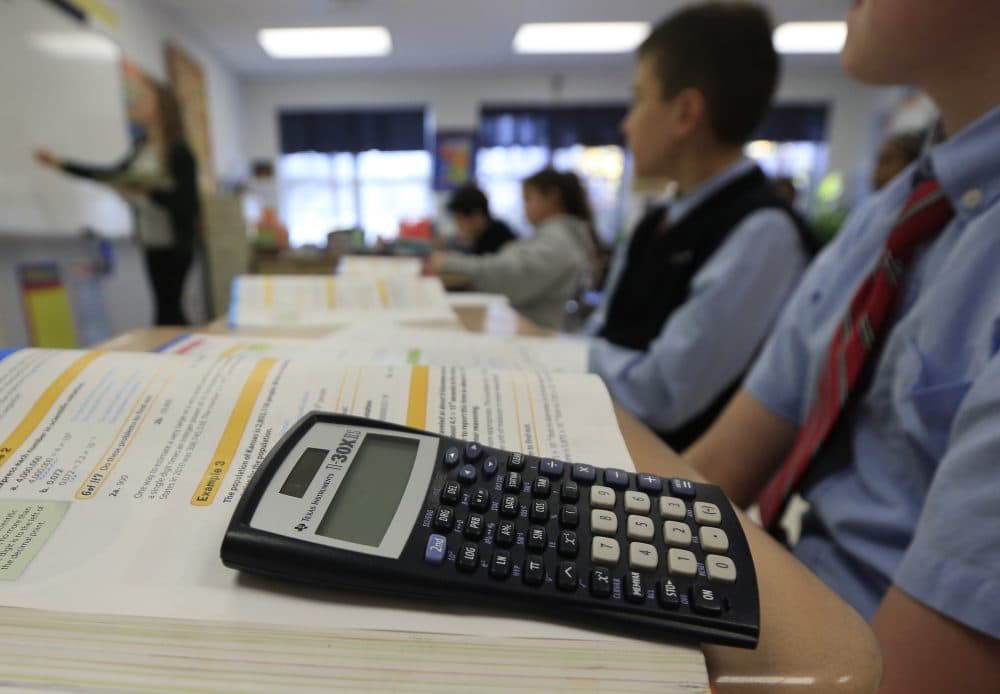Advertisement
Solving Our Math Problem
Do We Really Need To Learn Advanced Math? One Professor's Case For A More 'Practical' Approach
Resume
Do high school students really need to take calculus, geometry and trigonometry?
Andrew Hacker, a political science professor at Queens College, says no. He’s pushing for the adoption of “numeracy,” which, in simplistic terms, means the ability to measure, make estimations and break down simple percentages.
You might be thinking, “What does a political science professor know about math?” Well, Hacker says he’s spent his life studying people and society, and one thing he’s consistently noticed is that many Americans seem to have a fear of math.
Three years ago Hacker decided to begin teaching a course on numeracy, the practical application of math. What he’s found, he says, is that his students respond well.
I spoke with Hacker by phone about his theory and the process of teaching numeracy.
Tonya Mosley: Describe your numeracy class.
Andrew Hacker: All you need is arithmetic. I give them some challenging puzzles for example. Something like: The state of Pennsylvania, Republicans only got 48 percent of the votes but they ended up with 75 percent of the seats in the House of Representatives. How did that happen? Or we look at birth rates, all sorts of things like that. One of my students said to me at the end, “You know, I took calculus in high school but this numeracy course was more demanding.”
Why is that?
Because calculus is just about calculus, whereas numeracy is about the real world. You have to know about politics and voting. You have to know why birth rates go down. We look at figures and we ask why. The numbers begin to tell a story.
You’ve said that math is the success divider in high school. Can you expound on that?
I really believe anybody can really apply themselves to history or English literature and begin to understand it and make decent progress with it. There are a lot of people who just can’t come to grips with [math]. They’re not built that way and it’s not a matter of social class or race. I’ve heard children of professional parents or professional parents themselves say, “One of my daughters is a whiz at geometry and the other is becoming semi-suicidal over algebra.”
Some would argue math is vitally important.
I am all in favor of plain vanilla arithmetic all the way up through long division, decimals and fractions. Most of the time when we’re talking about math, we’re really talking about arithmetic. Numeracy means being at home with numbers, as almost a second language, or the kind of statistics we see in our newspapers and on television, being able to understand them.
What do you think is the problem or the disconnect that’s making it hard to rethink the way math is taught?
Let me be a little pretentious. There’s a phrase: “intellectual capital.” Intellectual capital is what you know, the knowledge in your head. Mathematicians know their intellectual capital is math. They’ve studied it. They teach it. They write about it. They think about it. And if you begin to say, “What you know isn’t that important,” [a person] could feel very defensive. This is why I call it the math myth. It’s making up reasons why people should study math.
I decided to run Hacker’s theory by Matthew Beyranevand. He is a K-12 math department coordinator for Chelmsford schools and an all-around math geek. He’s produced music videos, a TV pilot and even has a podcast all dedicated to mathematics.
Tonya Mosley: Andrew Hacker says high-level math like calculus and trigonometry is a waste of time for most students. Your thoughts?
Matthew Beyranevand: Calculus in particular provides [students] with problem-solving skills and thinking and reasoning and far more additional skills that they can apply throughout other areas of the STEM fields. In particular science, technology and engineering.
You were saying that you do agree with Hacker to a certain extent. What parts do you agree with him on?
Professor Hacker is very critical of K-12 mathematics education, and I think there is a lot of pressure on teachers to be able to cover all of the standards within the short time frame they have. There is a lot of pressure to be successful. I think we need to take a step back from that and think of mathematics in a little bit of a different lens and find the joy in mathematics that’s beautiful and interesting and engaging. Oftentimes teachers don’t have the ability to spend time on that, because they’re so stressed and focused on high-stakes testing and other state frameworks.
Those are descriptions I don’t hear often associated with math. Beautiful! Exciting! How have you tried to make it that way for your students?
That’s my professional mission is to be able to get students interested and engaged in mathematics. Part of it has to do with changing the way we teach within the classroom. I try to get things in like pop culture. Students like when they can generate their own questions about mathematics and they’re interested in and then able to focus on that.
Hacker actually believes America does a pretty good job teaching math from kindergarten through eighth grade. He says the problem arises when we enter high school, when all of a sudden instead of building on our arithmetic skills, we switch into loftier concepts.
Hacker, as you’ve heard, wants to see education instruction focused on "numeracy" — which would allow students to deepen their ability to use math concepts in the real world. Beyond that, he thinks higher-level math should be an elective for kids with a keen interest in going into STEM fields.
This segment aired on April 14, 2017.
